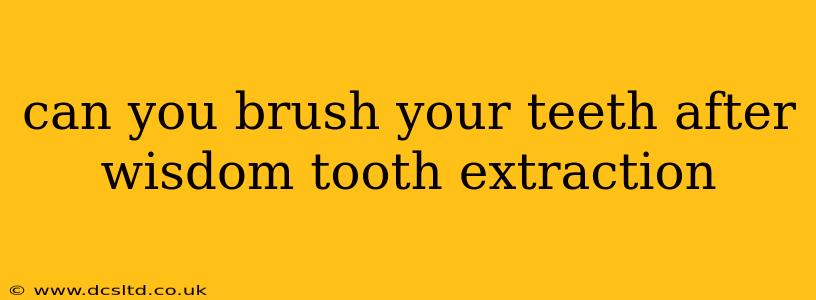Can You Brush Your Teeth After Wisdom Tooth Extraction?
The short answer is yes, but with caution. Brushing your teeth after a wisdom tooth extraction is crucial for maintaining oral hygiene and preventing infection, but the method requires a gentle approach to avoid disturbing the extraction site. Ignoring oral hygiene can lead to complications, so let's delve into the specifics of how to brush your teeth properly after this procedure.
How Soon Can I Brush My Teeth After Wisdom Tooth Extraction?
You should wait until the initial bleeding has stopped before brushing your teeth, typically a few hours after the extraction. Avoid aggressive brushing, especially near the extraction site, for at least 24 hours. Gentle brushing of the remaining teeth is perfectly acceptable.
What Type of Toothbrush Should I Use After Wisdom Tooth Extraction?
Opt for a soft-bristled toothbrush. Hard bristles can irritate the extraction site and dislodge the blood clot, which is essential for healing. A child's toothbrush might be a good option for its extra-gentle bristles.
How Should I Brush My Teeth After Wisdom Tooth Extraction?
- Gentle movements: Avoid vigorous scrubbing. Use soft, circular motions, focusing on the areas away from the extraction site.
- Avoid the extraction site: Directly brushing the extraction site should be avoided for at least 24-48 hours to prevent dislodging the blood clot and causing dry socket.
- Rinse gently: Use a saltwater rinse (1/2 teaspoon of salt in 8 ounces of warm water) several times a day to gently cleanse the mouth and promote healing. Avoid forceful rinsing or spitting.
- Focus on the other teeth: Don't neglect the rest of your teeth! Continue your regular brushing routine on the unaffected areas to maintain good overall oral hygiene.
What If I Have Pain or Swelling After Wisdom Tooth Extraction?
Pain and swelling are common after wisdom tooth extraction. Follow your dentist's post-operative instructions carefully. Over-the-counter pain relievers, such as ibuprofen or acetaminophen, can help manage pain. Apply ice packs to the affected area to reduce swelling.
Can I Use Mouthwash After Wisdom Tooth Extraction?
Avoid using alcohol-based mouthwashes or harsh mouthwashes for at least a week after the extraction, as these can irritate the healing tissues. Your dentist may recommend a specific mouthwash, such as chlorhexidine, to help prevent infection, but it's essential to follow their instructions.
What are the Risks of Not Brushing After Wisdom Tooth Extraction?
Failing to maintain proper oral hygiene after a wisdom tooth extraction significantly increases the risk of:
- Infection: Bacteria can easily enter the extraction site, leading to infection.
- Dry socket: This painful condition occurs when the blood clot is dislodged from the extraction site, exposing the bone and nerve endings.
- Delayed healing: Poor oral hygiene can prolong the healing process.
When Should I Call My Dentist After Wisdom Tooth Extraction?
Contact your dentist immediately if you experience:
- Excessive bleeding: Bleeding that persists for several hours or soaks through multiple gauze pads.
- Severe pain: Pain that is not relieved by over-the-counter medication.
- Signs of infection: Increased swelling, redness, fever, or pus.
- Difficulty swallowing or breathing.
Remember, following your dentist's post-operative instructions and practicing gentle oral hygiene are key to a smooth and speedy recovery after wisdom tooth extraction. If you have any concerns, do not hesitate to contact your dentist.
